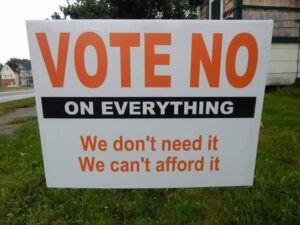Category Archives: Ballot Initiative
Colorado Property Taxes – Where Things Stand TODAY (pt.3)
Colorado Legislators Conspired to Increase Property Taxes? (pt. 2)
THIS is Causing Colorado Property Taxes to Skyrocket! (pt. 1)
Lewis: A wolf in sheep’s clothing
Lewis: A wolf in sheep’s clothing
Colorado’s Taxpayer Bill of Rights, approved by voters in 1992, was intended to limit the tax revenue that the state government can retain for spending ensuring that government spending doesn’t spiral out of control. However, it seems that a cunning wolf is attempting to enter the flock.
Prior to 2022, TABOR refunds were tiered based on the amount taxpayers paid. The more you paid in taxes, the higher refund you received. However, last year, Gov. Polis and the Democrats accelerated the refund process and sent out identical amounts to everyone, regardless of their actual tax payments. At the time it seemed innocuous, but now I’m not so sure.
As homeowners, many of us have just received our new property valuations. While I’m happy that my home value has increased dramatically, the thought of my new impending tax bill sent chills down my spine. The prospect of my taxes nearly doubling made me cringe. Fortunately, Colorado has a provision that limits property tax revenue increases to 5.5% so hopefully, the blow won’t be too severe.
Recently, the Colorado legislature passed a proposal to “lower” property tax rates, which sounds promising. However, upon closer examination, it’s apparent that this proposal is a wolf in sheep’s clothing. Rather than reducing taxes, it merely restricts increases while diverting money from our TABOR refunds to more than cover any revenue loss. Moreover, an attached provision effectively establishes a state-administrated welfare system funded by TABOR dollars. Talk about deceiving the flock.
Allow me to break it down for you. The property tax reduction proposition (Proposition HH) includes a provision to fund any loss of revenue from the general fund. Essentially, it’s a shell game. While the proposal claims to lower taxes, the net result is zero savings for taxpayers. Additionally, while it mandates limits on assessment rates, that actually won’t necessarily curb taxes since municipalities remain free to adjust their levies. There is a limit on tax revenue increases but, with today’s inflation, that limit would be higher than the existing 5.5% limit in place today. It’s like chasing your tail, going in circles with no progress.
Within this proposition, there is a second provision (HB 23-1311) regarding TABOR refunds, which would change the refund method to the single fixed value payout (as used in 2022) regardless of taxpayers’ actual contributions. Interestingly, this provision passes automatically if voters approve the property tax proposition. The reason behind connecting these two provisions is a mystery. It appears like a wolf is trying to sneak into the flock.
State Senate Majority Leader Dominick Moreno argues for equal distribution claiming that a tiered rebate system is not “equitable,” and that the money should go to those with the most need. But let’s pause for a moment. TABOR is not a welfare program — it is a tax refund program.
When it comes to refunds, rebates, or dividends, the amount you receive is typically based on your investment. If you’re a stockholder, the dividend you get depends on the number of shares you own. It’s straightforward. If you tax people based on their income and then rebate them a flat amount, it is no longer a taxpayer bill of rights — it’s a welfare program in disguise. In this case, an 18-year-old kid who plays video games all day in the basement of his parent’s house would get the same “rebate” as the parent who works 60-hour weeks and pays thousands in taxes. Is that truly equitable?
We strive for a society that strikes a balance between capitalism and socialism, supporting those in need while motivating everyone to work hard and enjoy the fruits of their labor. We already have various programs to aid those in need and always have the option to create more, but transforming TABOR into a socialistic welfare program administered by the state is disingenuous as that was never its intended purpose.
So, it all becomes clear now. There is a proposition to lower property taxes which most people will likely vote for, believing it will provide relief. The only problem is that it doesn’t actually lower taxes. I am going to dig into this further, but I actually think this bill could actually significantly increase taxes. Meanwhile, a hidden second proposition, covertly transforms a tax rebate program into a social welfare program, effectively turning TABOR into a new tax on higher-income residents. That is one sneaky wolf.
Mark Lewis, a Colorado native, had a long career in technology, including serving as the CEO of several tech companies. He retired from technology and is now writing thriller novels. Mark and his wife, Lisa, and their two Australian Shepherds — Kismet and Cowboy, reside in Edwards.
https://www.vaildaily.com/opinion/lewis-a-wolf-in-sheeps-clothing/

#DontBeFooled
#ItsYourMoneyNotTheirs
#VoteOnTaxesAndFees
#FeesAreTaxes
#TABOR
#ThankGodForTABOR
#FollowTheMoney
#FollowTheLaw
HB23-1311 By The Colorado Dems Would Eliminate Future TABOR Refunds

TABOR Gives Taxpayers a Voice
TABOR Gives Taxpayers a Voice
 By Dennis Polhill
By Dennis Polhill
A recent election result showed the great value of the requirement within the Taxpayer’s Bill of Rights for voters to approve new taxes or debt. There was a TABOR election in the Foothills Fire Protection District (FFPS). The outcomes measure how upset voters were with the proposed actions of elected officials.
Ballot issue 6B would have allowed the District to issue new debt. That was soundly defeated 74.11% to 25.89%
Ballot issue 6C would have increased taxes and it too was defeated, by 66.98% to 33.02%
The tactics used to obtain this taxpayer money were very questionable. A former board member who painstakingly reviewed all meeting documentation learned that there had been absolutely zero public discussion of the proposed ballot measures prior to the August meeting when the measure was placed on the ballot. Yet, the proposal passed unanimously – without discussion! Had something been happening behind the scenes, in violation of the Sunshine laws? Note that the August meeting was the last possible moment to meet the County Clerk’s deadline for a November citizen vote to put the referral to the ballot .
Paradise Hills Homeowners Association on Lookout Mountain accounts for close to half of the homes protected by FFPD and owns a vacant lot designated for open space use near an I-70 highway exit. At a Homeowners Association meeting an alert retired firefighter picked up on what was happening when it was mentioned that FFPD would buy the vacant lot for a new station for $400,000, yielding a significant rainy day fund or dues waiver for Homeowners Association owners. Did FFPD intend to buy their votes with their own tax dollars?
Citizens immediately started getting the word out; flyers were printed, yard signs went up, and a couple of large banners created. Comments on Nextdoor were not friendly to FFPD, resulting in the censoring from Nextdoor of some neighbors who posted information.
By this time the community was in angry uproar and five folks who otherwise likely would never have run for any office are now candidates for the five seats on the FFPD board due to be elected on May 2, 2023.

Special Districts and the Taxpayer’s Bill of Rights
There are over 4,500 local government agencies in Colorado. Nearly 3,000 of those are special districts. All of these agencies and special districts are included under our Taxpayer’s Bill of Rights (TABOR).
Most voters wouldn’t be able to list off the top of their head all the local governments collecting property taxes from them directly or passed on to them as a percentage of rent by the property owner in the course of business. You might have a couple or several of these governments charging you property taxes — lots of layers.
You can check your special districts using this Colorado Department of Local Affairs (DOLA) GIS map. It’s a great tool offering filters and layers so you get all the information. Click on the district map and you’ll get the annual levy rate and contact information for the district.
Why should we care?
Property Taxes
Special districts, especially metropolitan districts, can amount to a sizable portion of your property tax bill. Just because you don’t directly write the check for the property taxes doesn’t mean you’re not paying part or all of the property tax bill. Tenants and consumers pay a portion of the property taxes in rent or included in the cost of the products they buy. Continue reading
Murrey: Taxpayer’s Bill of Rights refunds in Democrats’ crosshairs
 Last year, Colorado Democrats championed TABOR refunds as they campaigned for reelection. Yet not a week into the 2023 legislative session, they announced plans to try and halt those refunds indefinitely.
Last year, Colorado Democrats championed TABOR refunds as they campaigned for reelection. Yet not a week into the 2023 legislative session, they announced plans to try and halt those refunds indefinitely.
A forthcoming bill by Rep. Cathy Kipp (D) and Sen. Rachel Zenzinger (D), if passed by the legislature and approved by voters, would allow the state to retain future tax refund dollars mandated under the Taxpayer’s Bill of Rights (TABOR) in Colorado’s Constitution. Kipp says the money would go to fund public schools.
Proponents of this idea have failed in the past to gather the 120,000 signatures required to put the question on the November ballot. The legislature can circumvent this requirement by passing the measure as a bill first.
Every time voters speak on key issues related to TABOR, they send the same unambiguous message: “Leave TABOR alone and let us keep our money!”
Democratic legislators either didn’t get the message, or they just don’t care what voters think.
In 2019 after voters gave Democrats unified control over state government, legislators thanked them by sending Proposition CC–which would have permanently ended TABOR refunds–to the November ballot, where Coloradans soundly rejected it.
Coloradans spoke loud and clear: “Leave TABOR alone and let us keep our money!”
In 2020, voters had the choice between two competing citizen-led ballot initiatives. One would have raised taxes and repealed TABOR’s requirement that Colorado maintains the same income tax rate for all taxpayers. The other, put on the ballot by my organization, Independence Institute, reduced the state’s income tax rate from 4.63 to 4.55 percent. The latter passed with a wide margin. The former failed even to gather enough signatures to appear on the ballot.
Once again, Coloradans spoke loud and clear: “Leave TABOR alone and let us keep our money!”
Fast forward to 2022. If the people of Colorado had not made their will clear enough already, last year left no ambiguity.
To continue reading this story, please click (HERE):
Report touts Colorado’s TABOR as ‘gold standard’ for state tax policy
Report touts Colorado’s TABOR as ‘gold standard’ for state tax policy
- By Derek Draplin | The Center Square
- Nov 4, 2022

Paul Brady Photography | Shutterstock
(The Center Square) – Colorado’s Taxpayer’s Bill of Rights is the “gold standard” for state tax policy, a new report argues.
The report, by the American Legislative Exchange Council, a free-market group that’s known for drafting model legislation adopted in Republican-led states, comes amid the 30th anniversary of TABOR, the constitutional amendment that Colorado voters passed in 1992.
TABOR requires voter approval for tax increases and limits state revenue growth to inflation plus the rate of population growth. It also requires revenue surpluses to be refunded back to taxpayers.
“TABOR is a resounding success for Colorado, despite ongoing attempts to eliminate it,” said Dr. Barry Poulson, author of the report and a professor emeritus at the University of Colorado Boulder. “TABOR uses a straightforward formula for limiting the size and scope of government by capping the rate of growth in state revenue and spending to inflation plus the rate of population growth.”
TABOR contrasts with California’s Gann Amendment, which the report says was “watered down” by special interests. Continue reading